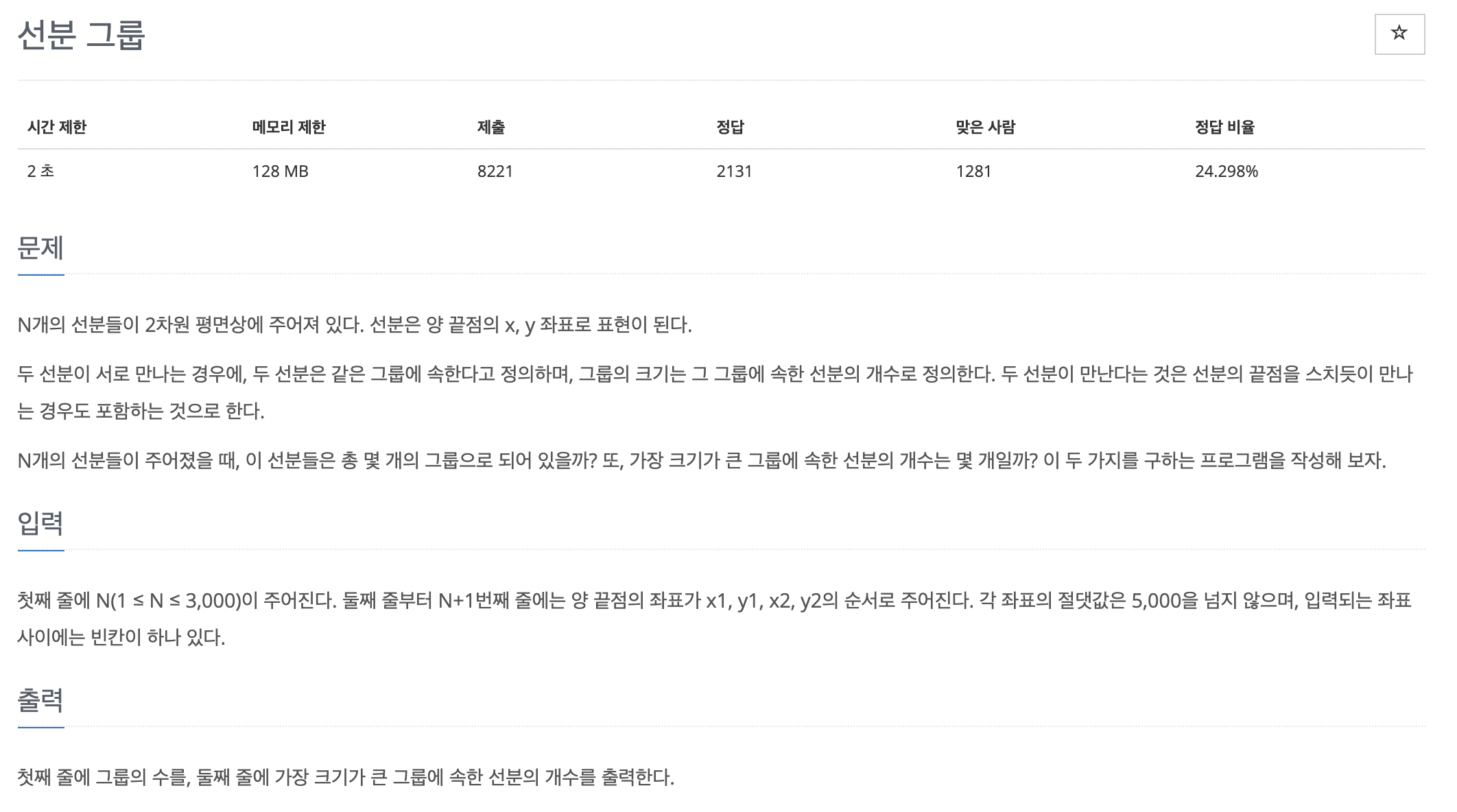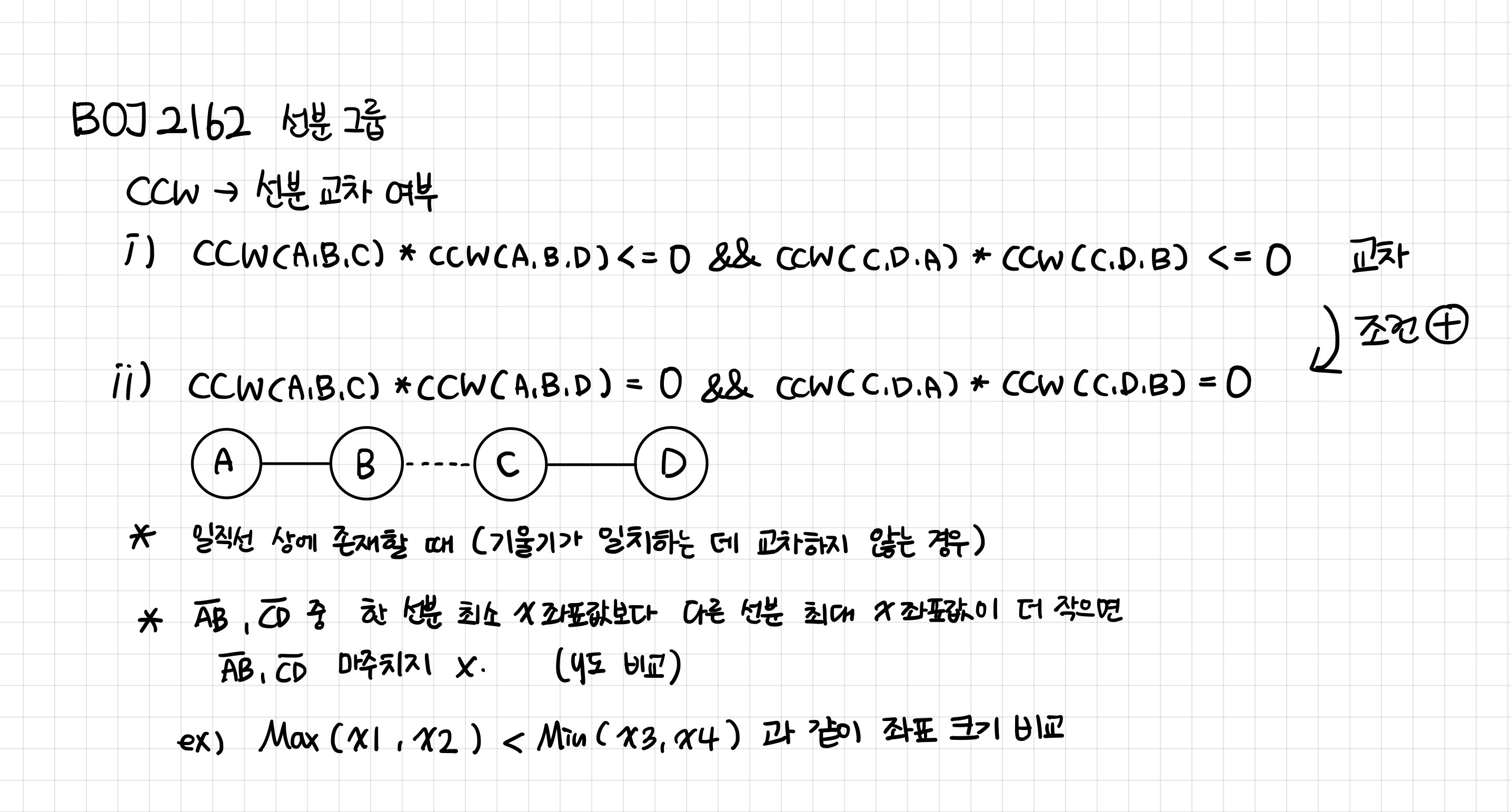Baekjoon Online Judge
algorithm practice
- 단계별 문제풀기
32. 기하
조금 더 어려운 기하 문제를 풀어 봅시다.
Java / Python
6. 선분 그룹
선분 교차를 응용하는 문제

이번 문제는 N개의 선분들이 주어졌을 때, 이 선분들은 총 몇 개의 그룹으로 되어 있는지, 가장 크기가 큰 그룹에 속한 선분의 개수는 몇 개인지, 이 두 가지를 구하는 문제이다.
CCW와 크루스칼 알고리즘을 풀 때 사용해봤던, union, find 함수와 Parent를 이용한다.

- Java
import java.io.*;
import java.util.*;
public class Main {
static class Line {
long x1, y1, x2, y2;
public Line(long x1, long y1, long x2, long y2) {
this.x1 = x1;
this.y1 = y1;
this.x2 = x2;
this.y2 = y2;
}
}
static int[] parent;
public static void main(String[] args) throws Exception {
BufferedReader br = new BufferedReader(new InputStreamReader(System.in));
BufferedWriter bw = new BufferedWriter(new OutputStreamWriter(System.out));
StringTokenizer st;
int N = Integer.parseInt(br.readLine());
Line[] l = new Line[N + 1];
parent = new int[N + 1];
for (int i = 1; i <= N; i++) {
parent[i] = i;
}
long x1, y1, x2, y2;
for (int i = 1; i <= N; i++) {
st = new StringTokenizer(br.readLine());
x1 = Long.parseLong(st.nextToken());
y1 = Long.parseLong(st.nextToken());
x2 = Long.parseLong(st.nextToken());
y2 = Long.parseLong(st.nextToken());
l[i] = new Line(x1, y1, x2, y2);
}
int l_parent, r_parent;
for (int i = 1; i <= N; i++) {
for (int j = 1; j <= N; j++) {
if (i == j)
continue;
l_parent = find(i);
r_parent = find(j);
if (l_parent != r_parent) {
if (isCrossed(l[i], l[j])) {
union(i, j);
}
}
}
}
int[] cnt = new int[N + 1];
int max = 0;
int size = 0;
for (int i = 1; i <= N; i++) {
cnt[parent[i]]++;
}
for (int i = 1; i <= N; i++) {
if (max < cnt[i])
max = cnt[i];
if (cnt[i] != 0) {
size++;
}
}
bw.write(size + "\n" + max + "\n");
bw.flush();
bw.close();
br.close();
}
public static int ccw(long x1, long y1, long x2, long y2, long x3, long y3) {
// CCW 공식 (x1y2+x2y3+x3y1)−(y1x2+y2x3+y3x1)
long result = (x1 * y2 + x2 * y3 + x3 * y1) - (y1 * x2 + y2 * x3 + y3 * x1);
if (result == 0) // 일직선
return 0;
return result > 0 ? 1 : -1;
}
// x의 부모 찾기
public static int find(int x) {
if (x == parent[x])
return x;
return parent[x] = find(parent[x]);
}
// y 부모를 x 부모로 치환하기 (x > y 일 경우 반대)
public static void union(int x, int y) {
x = find(x);
y = find(y);
if (x != y) {
parent[x] = y;
} else {
return;
}
}
public static boolean isCrossed(Line l1, Line l2) {
long check1 = ccw(l1.x1, l1.y1, l1.x2, l1.y2, l2.x1, l2.y1) * ccw(l1.x1, l1.y1, l1.x2, l1.y2, l2.x2, l2.y2);
long check2 = ccw(l2.x1, l2.y1, l2.x2, l2.y2, l1.x1, l1.y1) * ccw(l2.x1, l2.y1, l2.x2, l2.y2, l1.x2, l1.y2);
if (check1 == 0 && check2 == 0) {
return isOverlapped(l1, l2);
}
return check1 <= 0 && check2 <= 0;
}
public static boolean isOverlapped(Line l1, Line l2) {
if (Math.max(l1.x1, l1.x2) < Math.min(l2.x1, l2.x2))
return false;
if (Math.max(l2.x1, l2.x2) < Math.min(l1.x1, l1.x2))
return false;
if (Math.max(l1.y1, l1.y2) < Math.min(l2.y1, l2.y2))
return false;
if (Math.max(l2.y1, l2.y2) < Math.min(l1.y1, l1.y2))
return false;
return true;
}
}- Python (-시간 초과 / Pypy3)
import sys
input = sys.stdin.readline
N = int(input())
lines = [[]] + [list(map(int, input().split())) for _ in range(N)]
parent = [-1 for _ in range(N + 1)]
def ccw(x1, y1, x2, y2, x3, y3):
result = (x2 - x1) * (y3 - y1) - (y2 - y1) * (x3 - x1)
if result > 0:
return 1
elif result == 0:
return 0
else:
return -1
def check(x1, y1, x2, y2, x3, y3, x4, y4):
if ccw(x1, y1, x2, y2, x3, y3) * ccw(x1, y1, x2, y2, x4, y4) == 0 and ccw(x3, y3, x4, y4, x1, y1) * ccw(x3, y3, x4, y4, x2, y2) == 0:
if min(x1, x2) <= max(x3, x4) and min(x3, x4) <= max(x1, x2) and min(y1, y2) <= max(y3, y4) and min(y3, y4) <= max(y1, y2):
return 1
elif ccw(x1, y1, x2, y2, x3, y3) * ccw(x1, y1, x2, y2, x4, y4) <= 0 and ccw(x3, y3, x4, y4, x1, y1) * ccw(x3, y3, x4, y4, x2, y2) <= 0:
return 1
return 0
# 크루스칼 알고리즘
def find(x):
if parent[x] < 0:
return x
parent[x] = find(parent[x]) # 부모 테이블 갱신
return parent[x]
def union(x, y):
x = find(x)
y = find(y)
if x == y:
return
if parent[x] < parent[y]:
parent[x] += parent[y]
parent[y] = x
else:
parent[y] += parent[x]
parent[x] = y
for i in range(1, N):
for j in range(i + 1, N + 1):
x1, y1, x2, y2 = lines[i]
x3, y3, x4, y4 = lines[j]
if check(x1, y1, x2, y2, x3, y3, x4, y4):
union(i, j)
cnt = 0
max_value = 0
for i in parent[1:]:
if i < 0:
cnt += 1
max_value = max(max_value, abs(i))
print(cnt)
print(max_value)